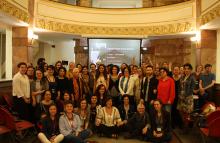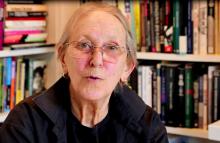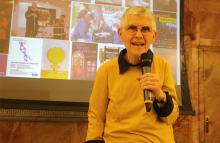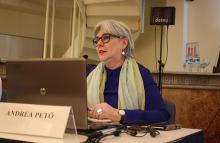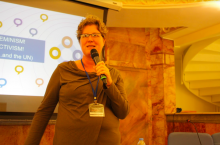Sabancı University Gender and Women's Studies Center of Excellence (SU Gender) held the Gender and Peace Conference at the Karaköy Minerva Palas on May 6 and 7, 2017. Discussions in the conference focused on women's activism, gender and struggle for peace around the world. The keynote speaker of the event was feminist activist and academic Cynthia Cockburn.
The Sabancı University Gender and Women's Studies Center of Excellence held a two-day conference on Gender and Peace at the Karaköy Minerva Palas. The conference had a rich agenda spanning experiences, thoughts and ideas on women's worldwide struggle for peace, and participants included keynote speaker Cynthia Cockburn, professor of international relations, comparative politics, gender, militarism and nationalism Cynthia Enloe from Clark University, US, and professor of gender and politics, women's movements and oral history Andrea Petö from the Central European University, Budapest.
On the first day of the conference, women activists spoke on how their paths crossed with Cockburn, a worldwide activist for feminist peace, and shared stories of how Cockburn strengthened the movement. Introducing keynote speaker Cockburn, Sabancı University Gender and Women's Studies Center of Excellence Director Ayşe Gül Altınay said that Cockburn’s thoughts were an inspiration to her since her student years.
“Masculinity is not genetic; it is rather a social construct”
Cynthia Cockburn, a leading figure in the "Women in Black" movement that formed in Israel in the late 1980s and spread across the world as a "network of action for peace", joined the conference with an exclusive video message. Cockburn said that she insisted on pronouncing the word "patriarchy" despite it being perceived as meaningless and risky, and argued that masculinity as the building block of the patriarchal system was not genetic in nature, but a social construct built by macro-politics. Cockburn based the ground covered and challenges faced by the gender movement on three pillars: the increase in examples that clash with the stereotypical; a greater number of male gender activists, and the effect of rendering sexual crimes invisible.
“It is not possible to fathom the source of militarism in Turkey without regard for women's rights"
Making a speech titled “Why Does Feminist Thought Matter at Times Like These?", Cynthia Enloe said that protecting and advancing women's rights was closely associated with opposing all kinds of militarism. Enloe expressed her conviction that women were not merely "soldier moms", "the avenged" or "homefront warriors", a point being repeatedly made by feminists, and were complete citizens instead. Saying that patriarchy only needed or honored women as long as they fulfilled their "loyal wife", "good mother" and "obedient citizen" roles, Enloe said: “Not enough.”
Women in the 1956 Hungarian Revolution: "Invisible, victimized, guilty"
Speakers on the second day of the conference included Andrea Petö from the Central European University, Budapest. In her speech titled “Remembering Women in the 1956 Hungarian Revolution as Illiberal Memory Politics”, Petö discussed the experiences of women in large-scale social change movements that are militaristic in nature based on the 1956 Hungarian Revolution.
Petö analyzed the Hungarian Revolution in three stages pertinent to women, saying that in the beginning of the conflict, women were made "invisible" and their role in a great social transformation was ignored early in the movement. She said that women were only involved in the legitimization of nationhood, where women were portrayed as "useful" to a national project. According to Petö, as patriotic femininity was brought to the limelight, the movement was not women's struggle, but a struggle against communism. Andrea Petö said that alternative histories emerged during the implosion of memory, and the frame of truth changed rapidly. Invisible or "victimized" women then began to appear more actively in their "warrior" roles. Petö said that the Hungarian Revolution was another instance of the patriarchy defining women as "passive" and "culpable".
At the end of the two-day conference that was followed closely by civil society, academia and activists, the matters discussed previously were revisited in the closing lecture, where it was emphasized that women's struggle for peace was critical to introducing different experiences to the society and nurturing dialog.
“The United Nations perceives the peoples of its member states as 'men'"
In her lecture "Women Redefining UN as a Peace-Building Organization: The Transformation of the Women-Peace-Security Agenda into an Activist Agenda" moderated by Andrea Petö, Vanessa Farr criticized the UN's modus operandi for not including the feminist perspective, and argued that the organization consisted of principles for freedom yet regarded the peoples of its member states as men. Saying that feminists kept the glimmer of hope alive by refusing to be outcast for years, Vanessa Farr continued "We are on the UN agenda if we commit ourselves to the protection of the patriarchy, but if there is any sort of political agenda, UN ignores us." Discussing Resolution 1325 of the UN Security Council, Farr underscored the importance of women's leadership and their involvement in the peace-building process for resilient peace. Vanessa Farr is a professor in the University of York School for Women's Studies, an advisor to various gender and women's departments in the UN Development Program, and an activist in the Women's International League for Peace and Freedom.
